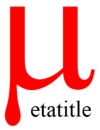No one knows exactly how many books there are in this world and if you knew it one minute ago you can be sure there are a lot more by now. Theoretically there can be no more than 999.999.999 book titles within the ISBN* system and if you know that each manifestation (e.g. paperback, hardcover, ebook) needs its own ISBN one could conclude that we are reaching the limits of the system soon. So something has to be done and there is not much time left. Two options are available, i.e. add some digits to the current 13 or stop using numbers only and make the ISBN alphanumeric. A serious problem is that ISBN (as part of EAN**) is an international system and this makes decision making rather difficult. So let us decide to do the the job ourselves and declare ISBN alphanumeric from now on and call it ISBN/X (the X is for 'Extended'). To start the easy way we should only make the check digit alphanumeric as this does not affect the uniqueness of the number. A check digit is only important in automated systems anyway and most titles are sold more and more directly by the author or by his or her publisher. So for them, being the most important players in the chain, this will be a unique opportunity to use and promote ISBN/X. As the alphabet has 26 characters a wide variety of product coding comes available. One could use different letters for different ebook formats (e.g. Epub, PDF, Mobipocket etc.). Or one could even think of a new way of presenting titles, i.e. presenting all manifestations of a title in one "metatitle'.
More about ISBN/X and metatitles on http://metatitle.org/EAN.html
* International Standard Book Number, a unique article number for books consisting of 13 digits where the first three digits represent the article group ' books' and the last digit is a check digit to make sure that errors in the number are detected.
** European Article Number
